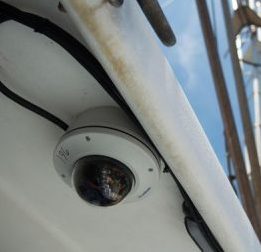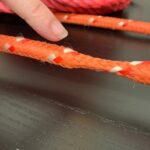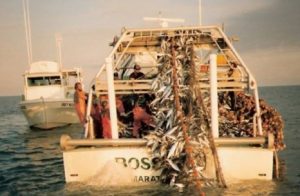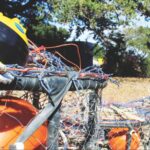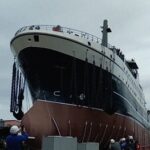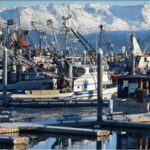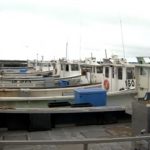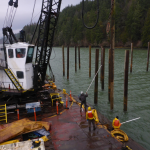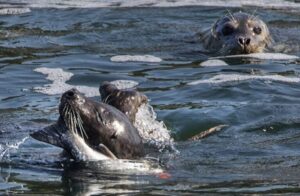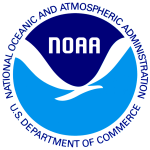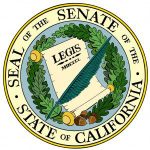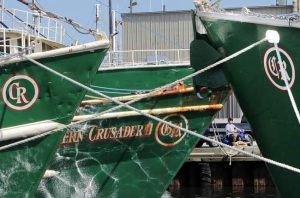Tag Archives: monitoring
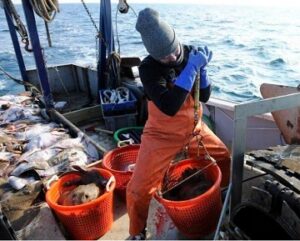
Rule change calls for monitoring of all groundfish trips – Not everyone is on board.
The most significant proposed change is a monitoring coverage target of 100% aboard eligible trips, which is higher than present monitoring levels. The change is meant to remove uncertainty surrounding catch. This and other changes, known as Amendment 23, to the Northeast Multispecies Fishery Management Plan were developed by the New England Fishery Management Council. According to a NOAA Fisheries fact sheet, the changes, if approved by NOAA Fisheries, would give groundfish vessels the choice of a human observer or using one of two types of electronic monitoring to meet the increased monitoring requirements, provided the sector has a corresponding approved monitoring plan and a contract with an approved service provider. >click to read< 12:37
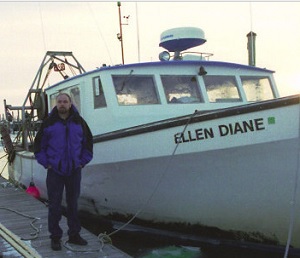
Your View: Turning fishery into police state won’t stop fraudsters like Carlos Rafael
First, I want to point out that none of this is to defend Carlos Rafael. The nicest thing he ever said about honest, small boat fishermen like me was to compare us to mosquitoes to his elephant. (“The maggots screaming on the sidelines, they’re done. They can scream all they want. Nobody can save them,”>click to read<) I do, however, think this case has one notable shortcoming in that the New York dealer who delivered his “bags of jingles” was never charged. Why? Maybe it is because enforcement used a crooked dealer as its star witness,,, by David Goethel >click to read< 22:23

David Goethel dropped us a note, and we thought we’d share it with you!
I saw your recently posted article about Carlos and Bullard’s ridiculous statement. Rafael’s own fishery complaints opened door to his downfall. Coast Guard report details extensive fishing violations (click to read) I went to that meeting driving 7 hours through a blinding snowstorm to speak for three minutes under public comment with the attached statement. I asked on the record why the corrupt fish dealer in NY was not arrested. I believe you are the only person who mentioned my comment.,,, This whole thing is a very carefully choreographed ballet to get cameras, not catch crooks. >click to read<, and please leave a comment at the bottom. Thank you.18:31
Senators and Congressmen – Problems that are facing the commercial fishermen today need your immediate attention
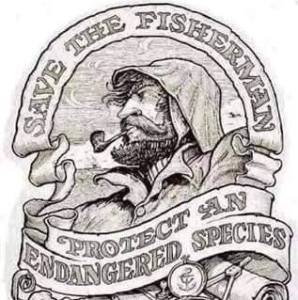 To whom it may Concern: I am retired fisherman out of Gloucester, MA. I would appreciate if our Senators, Congressmen and anyone in office would help us. I am listing some of the problems that are facing the commercial fishermen today and need your immediate attention and help. Most of these problems can only be resolved at the Federal Level. 1. The Magnusson Act needs to be updated. The wording needs to be changed so that the Courts and NOAA will have to consider and accept other scientific data.2. The Saltonstall Kennedy (SK) Act. Enacted in 1954.,,, click here to read the letter 10:11
To whom it may Concern: I am retired fisherman out of Gloucester, MA. I would appreciate if our Senators, Congressmen and anyone in office would help us. I am listing some of the problems that are facing the commercial fishermen today and need your immediate attention and help. Most of these problems can only be resolved at the Federal Level. 1. The Magnusson Act needs to be updated. The wording needs to be changed so that the Courts and NOAA will have to consider and accept other scientific data.2. The Saltonstall Kennedy (SK) Act. Enacted in 1954.,,, click here to read the letter 10:11
Department of Fisheries and Oceans considers making on-board cameras a must in N.S., P.E.I. tuna fishery
Canada’s DFO 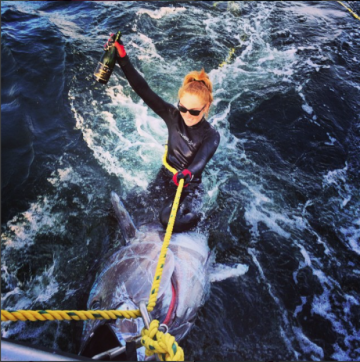 is considering making onboard surveillance cameras mandatory in the tuna fishery in northern Nova Scotia and Prince Edward Island. Next week DFO will release to industry its review of a two-year pilot project that saw cameras installed — starting in 2015 — for the first time in a commercial fishery in Atlantic Canada. The rear-facing cameras are aimed only at fishing activity. The department, which collects and reviews the data, says it may move to full implementation in the Gulf region for the commercial and charter boat catch-and-release bluefin tuna fishery in 2017. “This fishery has seen an increase in reports of non-compliance in recent years,” says a July 2016 briefing note prepared for the federal fisheries minister. More fallout from Operation Hook Up,,, continue reading the story here 10:17
is considering making onboard surveillance cameras mandatory in the tuna fishery in northern Nova Scotia and Prince Edward Island. Next week DFO will release to industry its review of a two-year pilot project that saw cameras installed — starting in 2015 — for the first time in a commercial fishery in Atlantic Canada. The rear-facing cameras are aimed only at fishing activity. The department, which collects and reviews the data, says it may move to full implementation in the Gulf region for the commercial and charter boat catch-and-release bluefin tuna fishery in 2017. “This fishery has seen an increase in reports of non-compliance in recent years,” says a July 2016 briefing note prepared for the federal fisheries minister. More fallout from Operation Hook Up,,, continue reading the story here 10:17
NOAA reduces monitoring/some catch limits for upcoming New England groundfish season
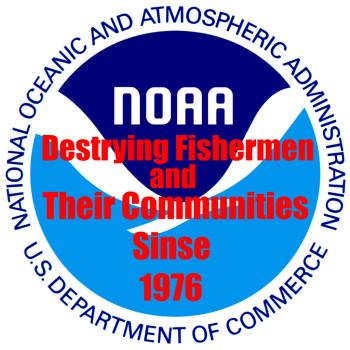 NOAA, according to the final rule filed Friday in the Federal Register, will cut monitoring to 14 percent of all vessel trips in 2016, down from about 24 percent in 2015. The reduction was welcomed by fishermen, particularly following recent federal policy changes leaving permit holders on the hook for the cost of at-sea monitoring. It was a disappointment for conservationists and environmental groups, who were seeking more coverage, not less. (The enviros are less than enthused!) Also reduced, Fishing advocates, however, were not pleased with the Framework 55 groundfish quotas that savagely cut catch limits for gray sole (down 55 percent from 2015), Georges Bank cod (down 66 percent), northern windowpane flounder (down 33 percent) and Gulf of Maine yellowtail flounder down 28 percent). Read the rest here 09:06
NOAA, according to the final rule filed Friday in the Federal Register, will cut monitoring to 14 percent of all vessel trips in 2016, down from about 24 percent in 2015. The reduction was welcomed by fishermen, particularly following recent federal policy changes leaving permit holders on the hook for the cost of at-sea monitoring. It was a disappointment for conservationists and environmental groups, who were seeking more coverage, not less. (The enviros are less than enthused!) Also reduced, Fishing advocates, however, were not pleased with the Framework 55 groundfish quotas that savagely cut catch limits for gray sole (down 55 percent from 2015), Georges Bank cod (down 66 percent), northern windowpane flounder (down 33 percent) and Gulf of Maine yellowtail flounder down 28 percent). Read the rest here 09:06
Monitoring The Catch Aboard Groundfishing Vessels
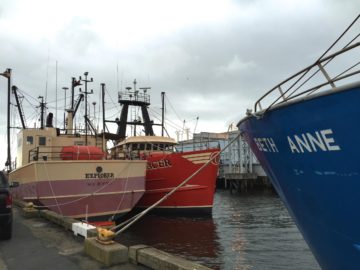 Regulations are stiff in the commercial fishing industry – and especially so for those who go after groundfish like cod and haddock. Now, one of the industry’s biggest players is accused of skirting those regulations for years – allegedly cooking the books and reaping big profits on illegally caught groundfish. As Brian Morris reports, that’s having a ripple effect on small, single-boat groundfishermen who play by the rules. Around the docks of New Bedford, people know Carlos Rafael as the “Codfather,” a legendary, self-made figure who dominates the city’s biggest industry. He manages a fleet of some 40 vessels, and also operates a fish distribution operation. Authorities raided his business in February, and federal officials allege he was changing documents – falsifying the types of fish he reported catching. Audio, Read the rest here 14:26
Regulations are stiff in the commercial fishing industry – and especially so for those who go after groundfish like cod and haddock. Now, one of the industry’s biggest players is accused of skirting those regulations for years – allegedly cooking the books and reaping big profits on illegally caught groundfish. As Brian Morris reports, that’s having a ripple effect on small, single-boat groundfishermen who play by the rules. Around the docks of New Bedford, people know Carlos Rafael as the “Codfather,” a legendary, self-made figure who dominates the city’s biggest industry. He manages a fleet of some 40 vessels, and also operates a fish distribution operation. Authorities raided his business in February, and federal officials allege he was changing documents – falsifying the types of fish he reported catching. Audio, Read the rest here 14:26
Environmental Defense Fund — Monitoring isn’t the fisherman’s enemy
 The port of New Bedford has been rocked by allegations of widespread and longstanding corruption by one of the industry’s biggest players. It is understandable that shocked fishermen, regulators, and community leaders are casting around for causes and solutions. Some have contorted the facts to fit their arguments against sector management. The truth, however, is that this alleged criminal misconduct started decades before the transition to sectors, and exploited a far older management flaw: the lack of sufficient monitoring in the fishery. It is a key reason why the fishery continues to be in crisis and in the headlines; and in the wake of this latest scandal it must be urgently addressed. Read the rest here 09:49
The port of New Bedford has been rocked by allegations of widespread and longstanding corruption by one of the industry’s biggest players. It is understandable that shocked fishermen, regulators, and community leaders are casting around for causes and solutions. Some have contorted the facts to fit their arguments against sector management. The truth, however, is that this alleged criminal misconduct started decades before the transition to sectors, and exploited a far older management flaw: the lack of sufficient monitoring in the fishery. It is a key reason why the fishery continues to be in crisis and in the headlines; and in the wake of this latest scandal it must be urgently addressed. Read the rest here 09:49
Gloucester: Sam Novello straight up tell’s it like it is. It ain’t pretty.
![]() A TV news segment earlier this week showcased what’s happening in – or what’s happened to — our fishing industry at the hand of our own government. It showed Al Cottone had caught his yearly quota of cod, not within a year, but within a period of just five hours. That’s what he was allowed for the year, and filled it in one tow. The arrogant John Bullard, who doesn’t qualify to be called with a prefix of mister, was asked by the TV reporter if he was insinuating that fisherman were liars — and he had to think for a minute to cover himself and say he wasn’t saying that. more@GDT 06:15
A TV news segment earlier this week showcased what’s happening in – or what’s happened to — our fishing industry at the hand of our own government. It showed Al Cottone had caught his yearly quota of cod, not within a year, but within a period of just five hours. That’s what he was allowed for the year, and filled it in one tow. The arrogant John Bullard, who doesn’t qualify to be called with a prefix of mister, was asked by the TV reporter if he was insinuating that fisherman were liars — and he had to think for a minute to cover himself and say he wasn’t saying that. more@GDT 06:15






